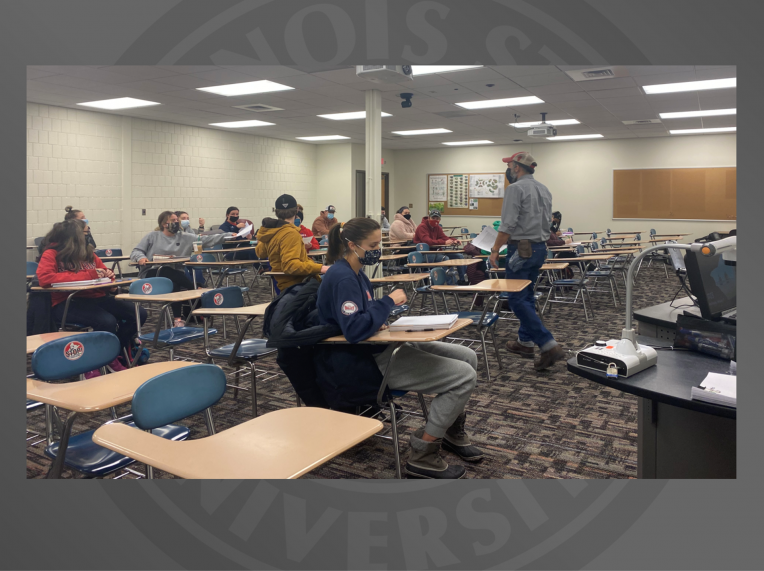There is no doubt that the COVID-19 pandemic has changed the way we live, work, and learn.
Many of the students, faculty, and staff around Illinois State University have had to adapt to a new and different learning environment put in place at the beginning of the academic school year. While most courses were either taught in online or hybrid formats last semester, there are several meeting in-person this spring—something that students and faculty are excited to talk about.
Associate Professor Dr. Justin Rickard ’04, M.S. ’08, has been teaching in the Department of Agriculture at Illinois State since 2011. His courses are typically focused in the areas of animal and meat science, while his research interests revolve around topics in basic animal science, general agriculture, and scholarship of teaching and learning in the animal sciences.
This semester, Rickard is teaching three different courses that meet completely in-person. His course on meat science is a traditional introductory class consisting of lecture and laboratory components. Food Animal Evaluation is a course that meets in both lecture and lab settings, looking at live animal or carcasses to learn how to survey animals for their value in the meat industry. He also teaches a course on current issues in the livestock industry, which relies heavily on class discussions.
The University has worked with faculty to put COVID-19 safety precautions into place within the classroom settings, taking steps to limit the number of students in courses, ensure social distancing is in place, and enforce mask-wearing in campus buildings.
Rickard is happy to be back teaching students in the classroom.
“My students will tell you that I don’t tend to use much technology in the classroom,” Rickard said. “Most of what I do is written on the board or discussion based. That obviously changed last semester when I taught online and hybrid courses, but I’m glad to be back in-person.”
One of his greatest challenges this semester has been learning how to read student reactions in the classroom setting.
“Everyone has to have a mask on at all times now, so it can actually be challenging to gauge whether or not students are understanding content or following along since you can’t see their full facial expressions,” he said.
While there are advantages to the hybrid and online course formats, Rickard feels that students are excited to be back in the classroom.
“It’s exciting to know that students want to be here and want to be learning,” he said. “I also think everybody has been very understanding of the challenges that have been faced across the board for students, instructors, and the University.”
One of Rickard’s students, Sam Wolff (an agriculture major with an emphasis in animal science) echoed that statement.
“I’m very excited to be back on campus this semester,” Wolff said. “There is a sense of normalcy in returning to campus, and I am very glad that some of my courses have allowed the in-person format. It’s nice to change up the setting in which the class is taught, so I am very appreciative I can be back.”
Wolff appreciates the smaller class sizes, which allow her to have more opportunities for discussion with instructors and classmates. She also noted that the switch to online and hybrid courses last semester was a challenge when it came to time management, so the return to an in-person setting is welcome.
“I would just like to thank all the professors that have continually worked with their students in this crazy time and made the most out of the situation we are in,” Wolff said. “Teaching in-person compared to teaching solely online is a completely different world, and I am very fortunate that my professors have gone out of their way to make sure their students are getting the most out of their education.”
To learn more about the courses and programs within the Department of Agriculture, visit the website here.

